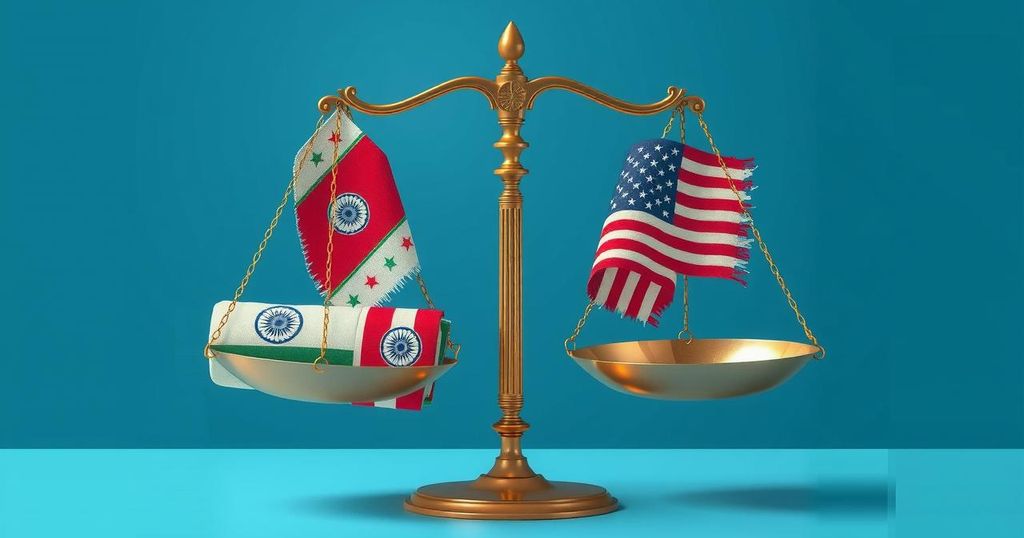Indian-American Lawmakers Critique Trump’s Reciprocal Tariffs as Reckless and Harmful

Indian-American lawmakers have condemned President Trump’s reciprocal tariffs as reckless and detrimental. They urge dialogue between the U.S. and India to address the challenges posed by such tariffs, which are predicted to harm consumers and weaken economic partnerships. Concerns have been raised regarding rising prices and potential recession risks as a result of these policies.
Indian-American lawmakers and members of the diaspora community have expressed severe criticism of the reciprocal tariffs imposed by President Donald Trump, labeling them as \”reckless and self-destructive.\” They have called for leaders from both the United States and India to engage in constructive dialogue to navigate these pressing economic challenges. On Wednesday, President Trump announced a 26 percent \”discounted reciprocal tariff\” on imports from India, justifying the figure by stating, \”India charges us 52 percent so we will charge them half of that – 26 percent.\” This decision also encompasses approximately 60 countries in an effort to counterbalance higher tariffs imposed on American goods internationally.
The Indian-American Congress members noted that these new tariffs will likely diminish the competitiveness of Indian products in the U.S. market. Congressman Raja Krishnamoorthi articulated concerns that Trump’s broad tariffs essentially constitute a tax on working families, implemented solely to enable tax reductions for wealthier Americans. He remarked, \”These latest so-called ‘Liberation Day’ tariffs are reckless… inflicting financial pain on Illinois at a time when people are already struggling to keep their small businesses afloat.\” He also cautioned that these tariffs will isolate the U.S. globally, weaken alliances, and burden American families with higher prices.
In a video statement, Congressman Ro Khanna further criticized the tariffs, remarking that Trump’s announcement \”isn’t an April Fool’s joke.\” He expressed vehement disapproval, claiming, \”Trump is literally trying to destroy our economy… there is total uncertainty.\” Khanna highlighted potential price increases for essential goods, questioning whether businesses should invest and referencing fears of an impending recession.
Congressman Dr. Ami Bera emphasized that these tariffs do not offer any economic benefit to American consumers, asserting, \”These tariffs will not make America wealthy again… This is not a tax cut. This is a tax hike.\” Ajay Bhutoria, an advisor and co-chair for the Economic Subcommittee for the AANHPI Commission, noted that the initiative will damage U.S.-India economic ties and significantly burden American consumers with rising costs. He stated, \”This sweeping policy will likely make Indian goods less competitive, while tariffs… will hit American consumers hard with an estimated additional $2,500 to $15,000 in annual expenses.\”
Wendy Cutler, Vice President at the Asia Society Policy Institute, remarked that these tariff rates will shock trading partners and adversely affect the U.S. economy, leading to heightened prices and slower growth. She noted that, \”Our close partners appear to be treated similarly to our rivals… Our partners will now be under domestic pressure to respond while helping their firms weather this storm.\” Cutler warned that global economic growth may significantly decline as a result of these tariffs, with the prospect of foreign delegations seeking exemptions in Washington.
In summary, the criticisms from the Indian-American lawmakers highlight the potential economic repercussions of President Trump’s reciprocal tariffs, urging both nations to dialogue to mitigate adverse effects on consumers and preserve economic collaboration.
In conclusion, the imposition of reciprocal tariffs by President Trump has sparked significant backlash from Indian-American lawmakers who view these policies as harmful and counterproductive. The lawmakers advocate for dialogue between the U.S. and India to resolve trade concerns while emphasizing the detrimental effects on consumers and the economy at large. The broader implications of these tariffs raise concerns about global economic stability and the necessity for strategic international relations.
Original Source: www.ndtv.com







